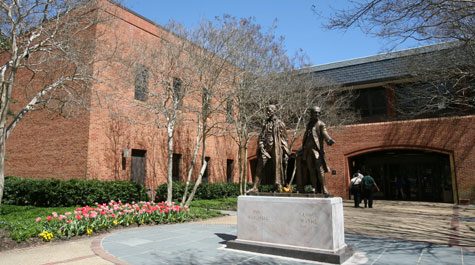U.S. Rep Zoe Lofgren (D-CA 19th district), chair of the House Subcommittee on Immigration and Citizenship, recently introduced a landmark congressional bill that would establish immigration courts as independent and assist in the protection of immigrants’ rights in court. H.R. 6577, known as the Real Courts, Rule of Law Act of 2022, was introduced Thursday, Feb. 3 and was considered by the House Committee on Judiciary Tuesday, April 5.
Members of the Immigration Clinic at the Marshall-Wythe School of Law have been working to garner attention and support for the bill in the local community. Dylan Abrokwa-Jassor ’24 is a government major interning at the Immigration Clinic and is responsible for the promotion of the bill.
“Basically, the bill would establish immigration courts as independent under Article I of the United States constitution,” Abrokwa-Jassor said. “To understand why the bill is so important, you have to look at how immigration courts are structured now. And, essentially, immigration courts are a part of, or are housed under the Department of Justice, and the Department of Justice is an executive agency headed by the United States Attorney General.”
Professor Stacy Kern-Scheerer, acting director of Clinical Programs and the director of the Immigration Clinic, briefly summarized the Clinic’s overall interest in the bill.
“You know, we were really looking for something that we could do outreach on and educate the community about, something that folks could think about,” Kern-Scheerer said. “It’s something that people may not find on their own, because it’s not on the front page of a lot of media, but it’s something that we are very interested in and passionate about because, as advocates who go into immigration courts and sometimes deal with immigration courts with our clients, we really see how the system is not independent”
Kern-Scheerer explained that the interrelationship between the Department of Justice and its immigration courts has profound impacts on the system of immigration justice.
Abrokwa-Jassor also expressed concerns regarding current immigration courts, as the current function of courts under the jurisdiction of the Attorney General can be interpreted as an inherently political system, as it can represent the interests of certain presidential administrations.
“Another big reason that this is important is that the people who are called immigration judges are not actually judges at all,” Abrokwa-Jassor said. “They more so function as employees of the executive branch. They actually don’t require any prior immigration law experience before becoming a judge, and they are just hired and can be fired by whatever attorney general is in the office at that point.”
Currently, there is a significant backlog of asylum and deportation cases under the Biden administration. Sunday, April 3, Immigration and Customs Enforcement issued a memo directing its lawyers to reexamine cases and attempt to clear cases classified as low priority under 2021 enforcement guidelines. At least 700,000 cases are estimated by the American Immigration Lawyers Association to meet this low priority classification.
Immigrant Justice Corps fellow Nicole Alanko summarized the key components of the bill.
“And so…the bill would take the immigration courts of the Department of Justice, take immigration courts and their appellate body, the Board of Immigration Appeals, completely out of the Department of Justice and make it akin to how tax courts are right now,” Alanko said.
Tax courts currently operate as federal trial courts and are independent judicial forums with cases decided by special judges. If H.R. 6577 was to pass, United States immigration courts would be made akin to tax courts and cease operation under the Attorney General. The Senate would be granted the authority to select an appellate judge, who then would pick immigration judges.
“We do see people who are appointed as immigration judges who maybe don’t even know immigration law, or have never practiced it, and so this bill would also require that judges who are appointed in this independent immigration court actually would have some experience with the immigration system,” Kern-Scheerer said.
Though the bill is nonpartisan, there have been almost exclusively democratic sponsors thus far.
“In terms of when you talk about this bill, it’s really just getting to the heart of one central issue. So there’s no kind of worry that, oh if I support this, am I supporting something else that I don’t want to support or don’t want to swallow or anything like that. It really is focusing on just creating this court system,” Alanko said.
Kern-Scheerer encouraged students and faculty to contact their senators and representatives in support of the bill.
“We always advocate for folks to contact your senators, your reps, and just say, ‘I support this bill. I think that independent immigration courts are for immigrants and you know, it’s a nonpartisan issue that we should be able to come together on,’” said Kern-Scheerer.
Abrokwa-Jassor has also constructed a detailed linktree with links to the actual bill as well as email templates and phone scripts for contacting senators and representatives in Virginia. His research was featured in a blogpost on the William and Mary Law School Immigration Clinic Blog, detailing the current state of immigration courts, necessary efforts to reestablish the immigration court system and potential improvements for H.R. 6577.
“Again, you can kind of look at this as democracy, as integrity of our judicial system, and as an immigrant rights issue,” said Kern-Scheerer. “And so, again, supporting organizations that would support the bill I think is also really important.”
Read Abrokwa-Jassor’s blogpost through the following link: https://wmimmigrationclinicblog.com/2022/04/15/h-r-6577-its-time-for-an-independent-immigration-court/
Correction (4/19): An earlier version of this article had a different headline using the word “endorse,” but was changed to better reflect the article.





























